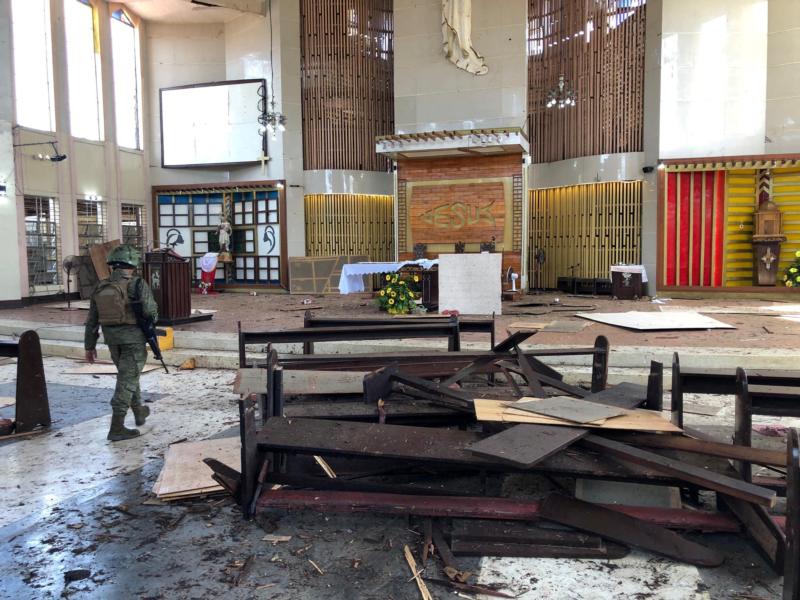By John L. Allen Jr.

ROME (Crux) – A bombing on Sunday at the Cathedral of Our Lady of Mount Carmel in Jolo, the capital of Sulu Province in the southern Philippines, left 20 people dead and 81 wounded. One of the IEDs exploded inside the church as Mass was going on, while another went off in the parking lot outside where most churchgoers had fled after the first blast.
Although there was no immediate claim of responsibility, it’s widely assumed that the Islamist terrorist organization Abu Sayyaf, or some similar faction, was behind the attack. The pastor of the parish, Father Jefferson C. Nadua, restricted himself to calling for prayers and begged off giving any further comment, while the bishops’ conference of the Philippines urged unity in the wake of the violence.
The carnage generated immediate outrage around the world, and so far has been condemned by the Filipino government, Pope Francis, and the Organization of Islamic Cooperation. Those leaders have expressed “indignation” (Yousef Al-Othaimeen, head of the OIC), the “firmest reproach” (the pope) and outrage at such a “dastardly crime” (Filipino authorities).
The one thing absolutely no one should be, however, is surprised.
Globally speaking, Christians are by far the most persecuted religious group on the planet. Though counts vary widely, the high-end estimate for the number of new Christian martyrs every year is around 100,000, while the low end is roughly 7,000-8,000 – which works out to a range of one casualty every five minutes to one every hour.
There’s no more common day for the perpetrators of anti-Christian violence to strike than on Sundays, when churchgoers gather to worship.
Yes, the Philippines is an overwhelmingly Catholic country – the third largest Catholic nation in the world in terms of population, behind Brazil and Mexico. That, however, is no guarantee of anything, especially in the Mindanao island group, where Jolo is located, and which has long been home to a militant Islamic separatist movement.
Sunday’s attack was actually the tenth such assault on the cathedral in Jolo, or in its vicinity, since 2000, all carried out by Abu Sayaf or like-minded militants. Abu Sayaf was also responsible for the December 25, 2010, bombing of Sacred Heart Chapel in Jolo, which injured 11 persons.
(Note the choice of Christmas day for that assault – in a cruel irony, the annual death toll in anti-Christian violence always spikes on Christmas and Easter, the holiest days on the Christian calendar when churches are always especially crowded.)
The Filipino government is obviously aware of the threat posed in Mindanao by armed groups such as Abu Sayaf. The bottom line is that neither Manila’s Malacañang Palace, the seat of the Filipino government, nor the international community ought to be blindsided by what happened on Sunday, and they might well be asking about their own inability (or unwillingness) to provide adequate protection for groups obviously likely to be the targets of such violence.
In the movie “Casablanca,” there’s a famous scene in which Captain Louis Renault, played memorably by Claude Rains, declares himself “shocked” to discover gambling at Rick’s nightclub. Immediately after that declaration, of course, an employee of the nightclub hands the captain his winnings from the casino, for which he unabashedly expresses thanks.
Too often when it comes to the kind of violence we saw on Sunday, politicians, prosecutors and other responsible parties employ a sort of “Casablanca defense,” professing dismay and declaring themselves stunned such a thing could have happened. They voice sympathy for the victims – “our thoughts and prayers are with you” – while de facto absolving themselves from any accountability by implying no reasonable person could have anticipated such an act.
Generally speaking, such protestations of shock and surprise are a bald lie, and that certainly applies to the Philippines. Abu Sayyaf has been a menace for decades, and is held responsible for scores of deaths, including the single worst terrorist incident in the history of the country (the bombing of a super-ferry in 2004.) The idea that they’d strike at Christians again, therefore, is hardly counter-intuitive.
Ironically, the bombing on Sunday came on the watch of Filipino President Rodrigo Duterte, whose “get tough on crime” stance is the stuff of legend. A Duterte spokesperson vowed that “the Armed Forces of the Philippines will rise to the challenge and crush these godless criminals,” but didn’t say anything about new security measures to prevent such assaults in the future.
In a way, it’s not fair to single out the Philippines, because the same tendency to invoke the Casablanca defense when Christians are brutalized takes place in multiple other parts of the world. It’s merely the most recent example, and probably not the most brazen.
For anyone who’s been paying attention to the reality of anti-Christian violence, therefore, Sunday’s death toll in Jolo may elicit a variety of emotions, from disgust to anguish and beyond. Surprise, however, definitely would not be in the mix.
Editors Note: Material from “Aid to the Church in Need,” a papal foundation supporting persecuted Christians around the world that’s active in the Philippines, contributed to this analysis.
